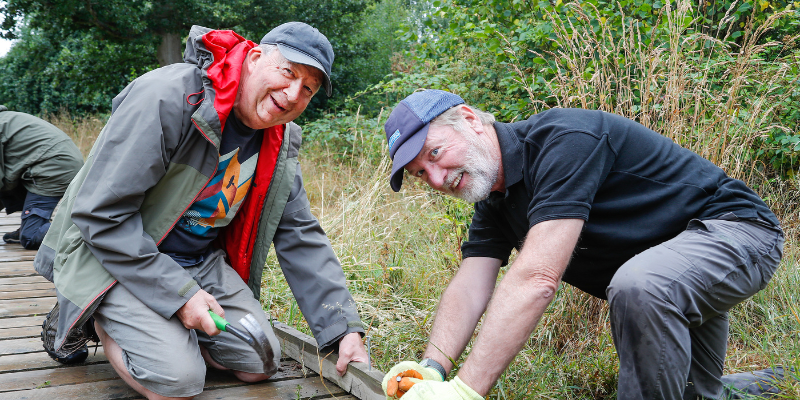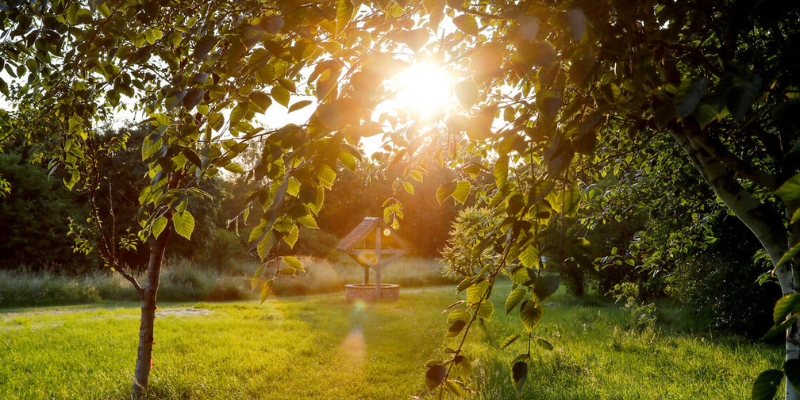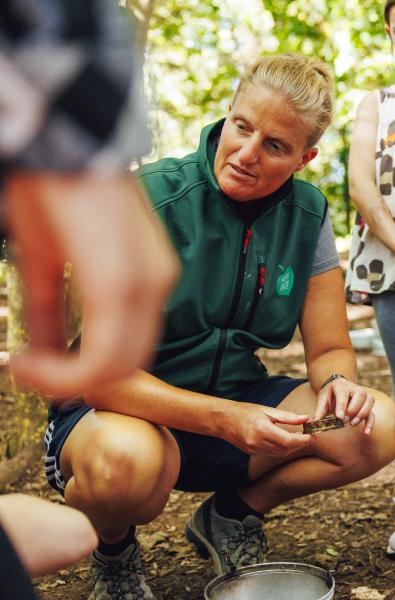
Connecting with nature
According to a study in 2015 (McMahan and Estes), contact with green and blue spaces led to improved life satisfaction, decreased anxiety, and increased happiness, while a 2019 study (Lackey et al) demonstrated that nature contact increased positive emotion and decreased negative emotions.
For many years, a growing body of research has reported the positive impact that nature has on mental health, and it has long been reported anecdotally the benefits that time in nature brings us.

What can nature contact do for us?
Human interaction with nature can bring many benefits. It can:
- Create a calming effect on the mind to reduce stress and anger.
- Elicit an improvement in your overall mood through noticing the beauty.
- Provdie physical benefits that impact on your mental health through being more active.
- Allow you to make connections with your community and space to show you that you are a part of something much bigger.
- Help with anxiety and depression.
- Improve sleep.
However, to benefit the most, it is not just about the time spent in nature but exactly how we connect with it. It is all about slowing down to stop, listen, and really notice our surroundings, rather than hurrying through them with our mind elsewhere.

How the Forest can support you
At the Heart of England Forest, we are passionate about connecting people to nature and all the benefits that brings, and we want to do our part to help reduce loneliness, low mood, and health conditions such as anxiety and depression in our local communities. The Forest is here to support you.
Spending time in the Forest can help us connect with nature which has been shown to improve our mental health. A report from Forest Research quantified for the first time the specific benefits of the UK’s woodlands, estimating that woodlands in England save £141 million costs associated with mental health illnesses, including visits to GPs, drug prescriptions, inpatient care, social services, and the number of days lost due to mental health issues.*
Exploring
The best way to explore the Forest is to follow one of our walking routes, which includes an accessible trail at Morgrove Coppice that aims to make it possible for more people to spend time in the woodlands. Whilst out in the Forest, look for wildlife, listen to birdsong, and have a chat with the people you meet. Why not maximise the benefits by practising forest bathing during your woodland walk?
Volunteering
Volunteering in the Forest is a fantastic way to improve social interaction. By participating in volunteering activities, you will meet a network of like-minded individuals. enthusiastic about the environment and united by a love of nature. It is also a great way to make friends if you have just moved to the area.
Our dedicated and knowledgeable team holds regular volunteering sessions each week, and our volunteers play an integral part in helping the charity meet its strategic objectives and achieve its ambitious goals. So, not only will you reap the social benefits of volunteering, but you will also be making a positive impact on the environment by helping to grow a native broadleaf forest.
What can you do if you live too far away to visit the Forest?
Whatever you try must be something that works for you and makes you happy; it doesn’t matter how small you start. Neither do you have to go to wild, remote places to reap the benefits. Nature on your doorstep has the same effect and ensures that you can develop a habitat over time.
The Derby Nature Connectedness Research Group through a project called ‘Improving Well-being through Urban Nature’ (a Natural Environment Research Council funded project) found that noticing three good things in nature each day increased well-being after a month in people with common mental health problems **. They have since developed a public app to do a similar thing: within the Go Jauntly app there is a Nature Notes section.
Things to try near you:
- Grow food or vegetables
- Forage for food (It is important to follow good practice, ensuring you do not negatively impact the natural environment and that you keep yourself safe)
- Rather than going to the gym, exercise outside
- Join a green activity like a litter pick or butterfly count
What about problems of access?
For some, it will be hard to get out and access green spaces for a variety of reasons, but you can also gain benefits by bringing nature inside:
- Add some plants to your home
- Put up a bird feeder outside a window to watch
- Go outside in your garden or from your window watch the stars or a sunrise and sunset
- Watch a TV documentary on nature
- Do some art connected to nature
- Write a poem about nature
These will all elicit a similar physiological relaxing response as spending time outside in nature would do.

Ideas to boost your mood all year round
Here are some of my favourite things to do all year round, perhaps they will inspire you:
Sit spots
Many nature connection sites will talk about these. It is about finding a special place near you where you can just sit and observe. You are giving yourself time away from the loud, busy world that we find ourselves inhabiting. It may feel uncomfortable at first and that is fine, but hopefully you can build up your time spent just sitting at peace.
Your spot can be anywhere, however, having a favourite will allow you to connect to the seasons and notice small changes that may otherwise pass you by. As you sit, engage each of your senses in turn, focusing fully on the space around you.
Walk without a purpose
How many times do you go for a walk with a clear destination or purpose in mind? Try walking instead more slowly and make decisions on where to go based on what looks interesting or where your mood takes you. Again, you will find yourself focusing on what’s around you rather than your inner thoughts, which may be negative.
Photograph the little details
Look around you for natural things that will make an interesting picture: that plant popping through a crack in the pavement, an insect that has landed on a flower, a close-up of a flower head or the ripples in some water. These are just a few ideas. How about also taking things from a different angle? Looking up into a tree or the sky? Taking a photo through a gap in a fence? Like the other activities, taking photos in this way will make you stop and notice the wonder around us, which in turn will lead to positive emotions.
You need to find something that works for you. This webpage has lots of great ideas and tips to get you started on your nature health journey How nature benefits mental health - Mind.

A Forest for people
In addition to protecting the environment, helping mitigating climate change, and providing vital habitats, the Heart of England Forest is here to support your physical health and mental wellbeing, and always will be.
If you are interested in sharing your experience about how the Forest offers you an escape, helps you combat isolation, or offers a place of solitude to remember loved ones, please consider getting in touch. We are looking for stories to share, so the word can be spread about how wonderful the Forest is and hopefully help others. We understand that these stories and experiences are very personal and can be of a sensitive nature and will be handled with care and the utmost respect.
Please get in touch with Julie, our Marketing and Communications Officer, if this is something you’d be interested in - julie.walton-evans@heartofenglandforest.org



